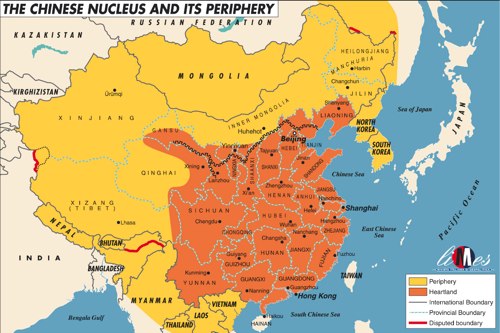印度网友评价:为什么中印能够和平共处这么久?
(译者:神刀)Why were China and India able to peacefully co-exist for so long?为什么中国和印度能够和平共处这么久?It is quit
(译者:神刀)
Why were China and India able to peacefully co-exist for so long?
为什么中国和印度能够和平共处这么久?
It is quite interesting to observe that for millennia, two neighbouring countries, ethnically, linguistically, racially diverse (and for some time religiously as well) were able to co-exist for thousands of years without wars in between. European powers been fighting each other for centuries, Greeks, Romans, Persians, Mongols, Arabs, etc.
很有趣的是,几千年来,两个相邻的国家,从民族、语言、种族(以及宗教上的不同),在没有战争的情况下,能够共存数千年。几个世纪以来,欧洲列强一直在互相争斗,希腊人、罗马人、波斯人、蒙古人、阿拉伯人等等。
How could India and China maintain the peace for that long (ignoring some recent post WWII border skirmishes)?
印度和中国怎么能维持这么长时间的和平(忽略了最近的二战后的边境冲突)?
网贴翻译
答案1:
Because China was actually pretty far from India.因为中国实际上离印度很远
For most of the past millennia, China and India were not "neighbouring countries" in any meaningful sense of the word. Most Chinese empires did not actually stretch all the way to the Indian subcontinent. It seems you're considering China and India based on their modern borders, but that is misleading: modern China possesses vast territories beyond its historic core.
在过去的几千年里,中国和印度在任何意义上都不算“邻国”。大多数中华帝国并没有真正地延伸到印度次大陆。你似乎在考虑中国和印度的现代边界,但这是有误导性的:现代中国拥有的大片领土,超越了其历史核心。
Although the Chinese established wide ranging empires at different points of history, they did so from a home country that's roughly located like the red shaded region below:
尽管中国人在历史的不同时期建立了广泛的帝国,他们是通过一个类似于红色阴影地区的“母国”来实现的:
The maximum extent of Chinese empires (the yellow bits) reflected the limits of their logistics from home. This "supply range", if you will, reached its longest under the sophisticated military science of the Manchurian war machine, during the Qing Dynasty.
中华帝国的最大范围(黄色部分)反映了他们在国内后勤上的局限性。这一“补给范围”,如果你愿意那样说的话,于清朝时期,在满洲战争机器复杂的军事科学的下达到最长。
The hostile geography in India's direction, and huge distances involved, made it difficult for China to actively pursue war any further from home. For reference, expeditions to Korea were major causes in ruining the once mighty native Chinese Sui and Ming Empires. And Korea could be resupplied by ships.
印度方向的恶劣地理环境以及巨大的距离,使得中国很难在从内地继续进行战争。作为参考,征讨朝鲜是破坏曾经强大的中国隋朝和明帝国的主要原因,何况朝鲜还能通过船只提供补给。
Actually, China has not historically been particularly adept at waging large scale war over long distances. Most of China's modern conquests are a legacy of its Manchurians conquerors, who ruled China for most of the modern era up until 1911.
实际上,从历史上看,中国并不特别擅长在远距离上发动大规模战争。中国的大多数现代征服都是其满洲征服者的遗产,直到1911年,他们统治着中国的大部分地区。
答案2:
The answer consists of 1 word - Himalayas.答案是一个词——喜马拉雅。
Okay, let me add the second word: Tibet.
OK,让我再添加第二个词:西藏
Basically, the two cultures have been completely separated by an insurmountable barrier (not to mention that the fact that India and China share a border today is an artifact of the 20th century, when China annexed Tibet).
基本上,这两种文化已经完全被一个不可逾越的障碍所分隔(更不用说今天的中印边界是20世纪的产物)。
答案3:
If you look at the map,如果你看地图,
you can see that there are highly mountainous regions covering northeastern India and Southwest China. So even if you draw a boundary line somewhere through these mountains, you can see that the desirability and likelihood of moving or fighting across these mountains is pretty slim (at least until 1962). They acted as a buffer zone between the two countries' population centers (on the eastern part of the map for China, on the southwestern part of the map for India). India's capital Delhi, is just west of these mountains, and China's capital, Beijing, is on the eastern edge of them.
你可以看到,印度东北部和中国西南地区都有高山地区。因此,即使你在这些山脉的某个地方划出一条界线,你也可以看到,在这些山脉之间移动或战斗的愿望和可能性是非常渺茫的(至少在1962年之前)。他们充当了两个国家人口中心之间的缓冲地带(中国地图的东部,印度地图的西南部分)。印度的首都德里,就在这些山脉的西边,而中国的首都北京,位于它们的东部边缘。
The area in between includes some of the most desolate, difficult territory in the world.
其间的区域包括一些世界上最荒凉、最艰难的地区
答案4:
They were peaceful because they didn't LOOK for wars and preferred trading with each other. Although many answers give simple reasons for NOT fighting war as a cause for peace I think that is based on the assumption that they were LOOKING for war with neighbours. But I present you a different point of view removed from the assumption that peace comes not from ceasefires or destructive deterrents nor lack of interest in invading but rather the natural tendency to live harmoniously with neighbours.他们和平相处,是因为他们不寻求战争,也不喜欢互相贸易。尽管许多答案都给出了不打仗的理由,但我认为这是基于他们“寻求与邻国开战”这一假设。我向你们展示了一个不同的观点,即和平并非来自于停火,也不是破坏性的威慑,也不是对侵略的缺乏兴趣,而是与邻国和谐相处的自然倾向。
Fact is both India and China were trading with each other for more than 2000 years via the silk road and maritime routes. Himalayas are not the only route! they can go meet through Burma and we know both of these countries have been a sea faring nation for a much longer time than Europe. It has been documented Buddhism, sugar, Indian astronomy and some math, wootz steel, cotton among other things has traveled to china from India, while India bequeathed from the chinese silk, fishing nets, gunpowder and various tools among other things. Thus to say war couldn't have happened because its too far is facile as there were already long established trading routes and commodity driven markets that were apparently ready for the taking for the Europeans. In fact, if you look up the Indian ocean trade it was largely peaceful between africa, middle east india and china until the europeans entered the fold 800 years later. This is supported by John Greene of Crash Course series on Youtube.
事实上,印度和中国都是通过丝绸之路和海上路线在2000多年间进行贸易往来的。喜马拉雅山并不是唯一的途径! 他们可以通过缅甸见面,我们知道这两个国家都是比欧洲更长久的海洋国家。根据文献记载,佛教,糖,印度天文学,还有一些数学,乌兹钢,棉花以及其他的东西从印度来到中国,印度人则把中国的丝绸,渔网,火药和各种工具保留了下来。因此,战争是不可能发生是因为它们相距太遥远了,因为已经建立了很长的贸易路线和商品驱动的市场,而这些市场显然已经准备好迎接欧洲人了。事实上,如果你查一下印度洋的贸易,它在非洲、中东、印度和中国之间基本上是和平的,直到800年后欧洲人进入了。这一点为约翰·格林在Youtube上的速成课系列节目所支持。
Thus the assumption that distances are too far to wage war is a self defeating argument as there are were tons of exchange happening already for a very, very long time. China is even mentioned in the Mahabharatha.
因此,认为距离太远而不能发动战争的假设是一种自相矛盾的论点,因为在很长很长时间内已经有大量的交易发生。甚至摩诃婆罗多都提到过中国。
But I am also questioning the mindset that to have peace only the absence of war is necessary. This maybe true now, but as I have demonstrated peace existed among the most economically strong countries such as India and China for millennia without having to wage constant wars. There have been many instances in history, but not really touched upon in western history books, of cultures conducting business and exchange largely peacefully for centuries without resorting to military support.
但我也在质疑这样一种心态,即只有在没有战争的情况下才有和平。这或许是事实,但正如我所展示的那样,在印度和中国等经济实力最强的国家中,和平已经存在了几千年,而不需要发动持续的战争。历史上有过很多这样的例子,几个世纪的时间里,文化和商业的交流在很大程度上是和平的,而没有诉诸军事支持,但在西方历史书籍中却没有真正触及过。
答案5:
As mentioned, the two areas have been historically very decoupled. Very few (any?) crops moved from one region to the other in antiquity. Agriculture and writing seem to have evolved independently in both areas, implying lack of contact. Ironically, the region with the most extensive cultural transmission in Asia was Mongolia/Siberia, since the people there were much more nomadic.如前所述,这两个地区在历史上是非常分离的,很少有人从一个地区迁移到另一个地区。农业和书写(注:也许意思是文化)似乎在这两个地区都是独立发展的,这意味着缺乏联系。具有讽刺意味的是,亚洲文化传播最广泛的地区是蒙古和西伯利亚,因为那里的人们更加游牧化。
版权声明
我们致力于传递世界各地老百姓最真实、最直接、最详尽的对中国的看法
【版权与免责声明】如发现内容存在版权问题,烦请提供相关信息发邮件,
我们将及时沟通与处理。本站内容除非来源注明五毛网,否则均为网友转载,涉及言论、版权与本站无关。
本文仅代表作者观点,不代表本站立场。
本文来自网络,如有侵权及时联系本网站。
阅读:
-
1
चाइना में रेडी और ठेले Local shops in china || L...
- 2
- 3
- 4
- 5
- 6
- 7
- 8
- 9
- 10
-
1
चाइना में रेडी और ठेले Local shops in china || L...
- 2
- 3
- 4
- 5
- 6
- 7
- 8
- 9
- 10











